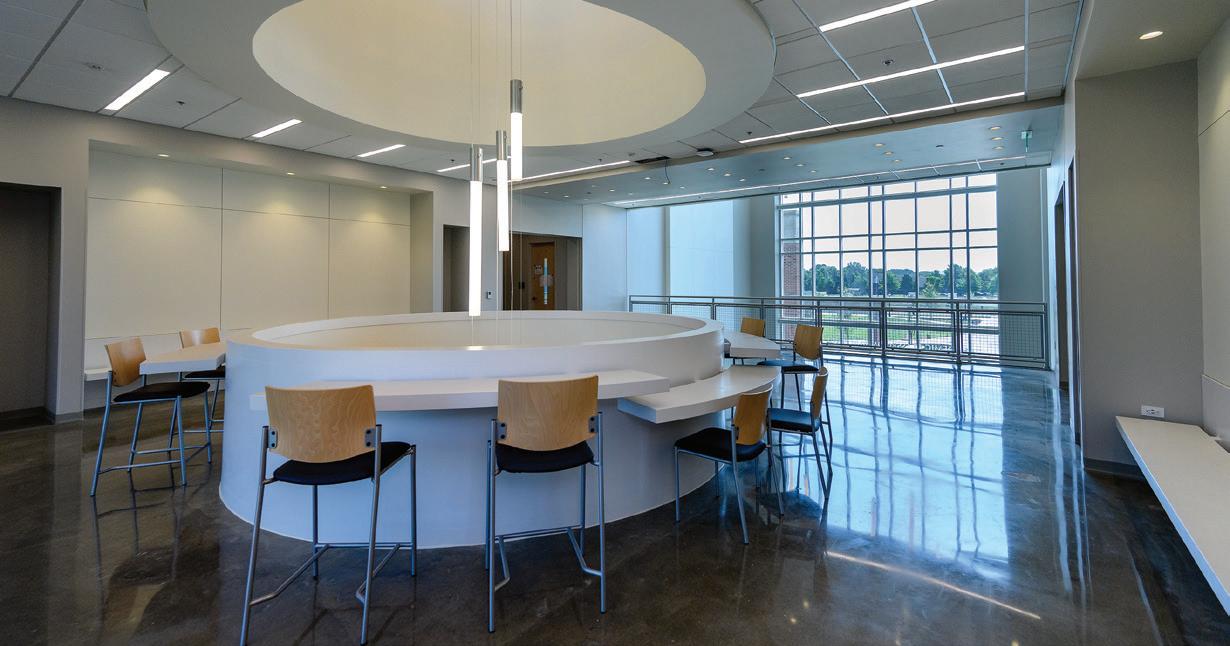
7 minute read
Justice for All
As long as there is crime, there will be a need for the criminal justice system. Whether in the punishment, confinement, and rehabilitation of perpetrators or in helping victims pursue justice, MTSU’s Criminal Justice Administration program offers preparation for entering and advancing among the ranks of the industry’s professionals. Graduates have become lawyers, police officers, corrections officials, and more. mtsu.edu/criminaljustice

JUSTICE FOR ALL New academic building that houses MTSU’s Criminal Justice Administration is designed to grapple with modern-day realities
MTSU’s $39.6 million Academic Classroom Building, the new home of the Department of Criminal Justice Administration, is a timely project given the world we live in today. In the midst of the ongoing COVID-19 pandemic, as well as nationwide social unrest in the wake of police brutality along racial lines, academic work that will take place in the new building could have far-reaching positive impacts on society as a whole.
“The new building symbolizes growth for our respective departments and college, and our part of our growth is demonstrated in how we as a college, even during a pandemic, continue to look forward to the future,” CJA Interim Chair Lee Wade said.
“Moreover, we also will have several meeting spaces in our facility that can host community discussions, events for impactful social justice speakers, and collaboration with faculty from our three departments to impact students who will become future leaders in the justice system.” Given the challenges currently facing America’s criminal justice system, college and university programs have a clear role to play in making a difference in the social justice sphere. Many are grappling with what might be missing from the current curriculum of CJA students that could hasten systemic change. Organizing new collaborations with departments of Psychology, Social Work, History, and Sociology and Anthropology to round out student perspectives on social issues could prove beneficial for current and future CJA students. Such cross-disciplinary study, featuring open and honest discussions about crime rate discrepancies, racial and ethnic biases, excessive force, the role of police, and institutional racism, may well become essential components of updated CJA degree programs preparing law enforcement professionals to better serve the communities they police. With its brand-new, collaborative facility opening for Fall 2020, MTSU is positioned to be a leader in higher education’s response to justice-related issues.
The scope of the CJA program at MTSU is expanding, though, even beyond the issues dominating 2020 headlines. According to the former chair, Lance Selva, “We’re going beyond traditional criminal justice. . . . We’re expanding into homeland security, emergency management, . . . predictive analytics. . . . We’re talking about new technologies capable of securing the United States.”
In addition, the new facility has a command center where CJA students can practice coordinating and mobilizing resources when disasters strike.
“We’ll be getting into . . . disaster-relief management, too. We’ll be bringing in experts to help our professors teach the latest methods of coordinating resources . . . [and how] to run simulation scenarios involving various disasters,” Selva said.

“We’ll have . . . an emergency-simulation room with 28 computers, multiple projectors, and four 80-inch monitors. . . . This will be hands-on learning, not abstract learning.” Speaking of experiential learning, MTSU currently places CJA interns with more than 30 criminal agencies, including district attorneys’ and public defenders’ offices; police and sheriffs’ departments; probation and parole offices; circuit, juvenile, and drug courts; and several state and federal level agencies. Students not only experience the pragmatic operations of the criminal justice system but also the applications of theory to the profession. The overall 91,000-square-foot building offers amenities that were unimaginable in previous departmental configurations. But just how badly was it needed? Throughout most of the 1970s, the precursor to MTSU’s Center for Historic Preservation operated out of the second story of an old house on East Main Street, retrofitted to accommodate academic offices. At the bottom of the creaky, otherwise unremarkable stairs, were the offices for the CJA program. Right about the time Ronald Reagan moved into the White House, Mother Nature served up enough rain and wind to force Selva, his CJA colleagues, and their historyminded peers upstairs to relocate. “The irony is not lost on me that the roof above the historic preservation department upstairs caved in, forcing us from that historic, old building,” Selva quipped. Nobody was hurt, and the respective offices would soon find temporary new spaces, and eventually permanent homes. Well, sort of.
“The Department of Criminal Justice Administration, as well as the Department of Psychology, were located in Jones Hall,” Selva said, with a bemusement that conveyed an unapologetic lack of enthusiasm for the space. To his credit, the words also conveyed a practical reality rather a petty complaint. “We were literally in dormitory rooms. I was separated from my administrative aide by an entire floor. We truly had no space, and there was simply no direct contact. It was not conducive for much,” he explained. “What served as our conference room can’t even hold my faculty—six of them had to stand up when we were all in there. So I held my faculty conferences in the dining room of my home— it’s twice as big.” Wade, the new interim chair, summed it up by saying the positive impact for CJA students in the new Academic Classroom Building “is having convenience and consolidation of faculty and staff for them.” “Some of the convenience for students is having access to the latest technology resources in the building, especially on the third floor, which houses many computer labs and research labs,” Wade said. “All floors have modern classrooms, student collaborative spaces, and access to faculty. Also, faculty and advisors are both available in the same building to help mentor students towards academic achievement.” Sounds like a recipe for some much-needed societal solutions.
MTSU

MTSU’s Department of Criminal Justice Administration already boasts a top-ranked program nationally. The new Academic Classroom Building only stands to swell its profile. MTSU was ranked in 2019 as having one of the best online bachelor’s degree programs in criminal justice across the country, according to TheBestSchools.org. The website, which tries to connect prospective students with available online degree programs, reviewed all accredited online criminal justice bachelor’s degree programs in the U.S. to select the top 50 programs nationally.

Top programs were selected based on curriculum quality, faculty excellence, rankings, awards, and each school’s reputation for providing quality online degrees. Ranked No. 37, MTSU’s program offers an online Bachelor of Science in Criminal Justice Administration, with support from University College. MTSU was one of only two Tennessee universities on the list, the other being Bryan College (No. 40).
PROOF IN THE PUDDING
CJA boasts many prominent alums, and there will no doubt be more in the pipeline as a result of the construction of the new Academic Classroom Building for MTSU’s College of Behavioral and
Health Sciences.
One alumnus was recently personally invited by the president of the United States to participate in a national symposium. CJA graduate Monty Burks, who was featured on the cover of a previous edition of Outcomes, joined President Donald Trump at the podium at the Rx Drug Abuse and Heroin Summit in April 2019 in Atlanta. Burks, director of Faith-Based Initiatives/ Division of Substance Abuse at the Tennessee Department of Mental Health and Substance Abuse Services, was previously the keynote speaker for the Indiana Minority Health Conference in Indianapolis. President Trump introduced Burks, whose remarks aired on C-SPAN. Another MTSU alumnus was recently named one of only six scholars in history to receive all three top awards from the American Academy of Criminal Justice. J. Mitchell Miller, who earned his bachelor’s and master’s degrees in Criminal Justice Administration from MTSU in 1990 and 1991, respectively, was selected for the ACJS Founder’s Award, which is presented for “outstanding service to ACJS and the profession.” Miller is a professor in the Department of Criminology and Criminal Justice at the University of North Florida in Jacksonville.

MODERN JUSTICE
Associate Professor Ben Stickle is just one example of a CJA faculty member who will benefit (and whose students will benefit) from the $39.6 million Academic Classroom Building. Stickle recently co-authored the first known academic study of “porch piracy,” the theft of delivered packages from outside people’s homes while they are away. Stickle also authored a recent research paper in the American Journal of Criminal Justice reconsidering the way crime statistics are analyzed as a result of changes brought about by the COVID-19 pandemic. Stickle posited that the novel coronavirus tragedy presents a unique opportunity for a “randomized control trial.” He advocates considering crime data from the onset of the pandemic in terms of time periods that correspond to lifestyle differences. “How we spend our time, our routine activities, is really what’s shifted,” Stickle said. “The typical ways that we research crime and break things down don’t really apply anymore.” Last but not least, in a great example of inter-professional collaboration, Stickle and Social Work Professor Vicki Harden were recently awarded $166,000 from Rutherford County for their role in the Keeping Family Connections Project funded through the U.S. Department of Justice to address the needs of incarcerated parents and their children.







